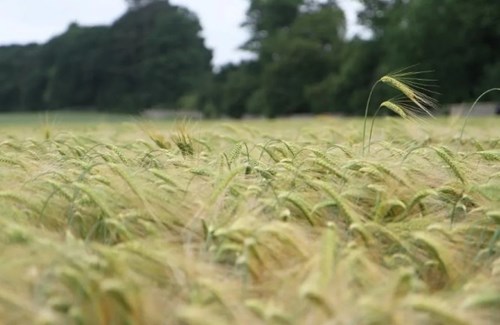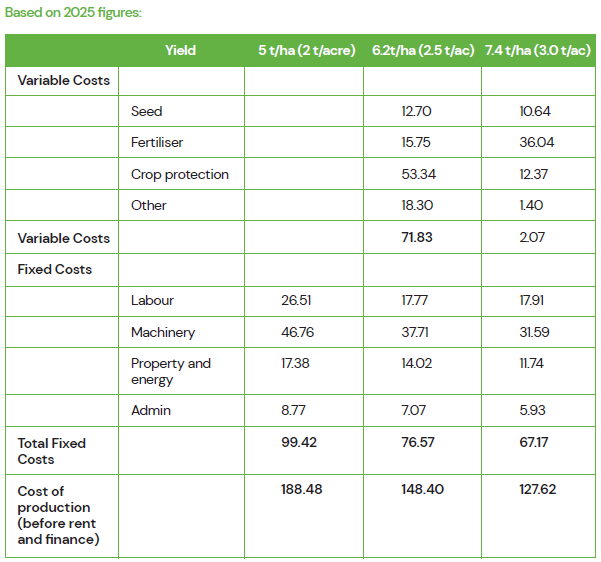Malting Spring Barley – What’s the Alternative?

Spring crop yields and quality have been variable across the 2025 harvest, with reported high screening levels and variable nitrogen levels, leading to very few growers making malting spec. To add to the situation, tonnage required by maltsters is has been greatly reduced this year and is predicted to be back for the foreseeable year or two. Despite yields being better than expected, barley quality being poor has left many parts of Scotland awash with feed barley. Cereal margins are causing concern for arable farmers, with some fields having failed to cover the cost of production, leaving many with the challenge and decision of what to grow for harvest 2026.
Spring Barley Cost of Production
The cost of production for spring barley will vary from business to business but the table below gives an indication of where prices need to be in order to make a margin at varying yields.

These figures include fixed costs (except rent and finance) which can vary widely between businesses and are a major cost in crop production. These are probably where costs can be trimmed to improve margin. Yield plays a significant part in the cost per ton but keeping a sharp eye on variable costs can make a difference too. Market demand will mainly determine where contract terms will stand for the coming year.
What Are the Other Options?
Spring oats may be an option in some areas. It is important to make sure you have a contract in place for supply before making any cropping decisions as markets are limited, plus the ability to long term store oats is also an advantage. Some contracts also require the supplier to have their farm LEAF accredited.
Spring beans and peas may also be an option for an alternative spring crop. These are becoming more common in some areas especially with mixed farmers trying to reduce their reliance on bought in protein. Here are some things to consider when growing these crops:
Spring beans:
- Get them sown as early as you can.
- No nitrogen requirement but phosphate and potash can be required dependent on soil status.
- Sulphur requirement of around 25kg SO3/Ha.
- Herbicide main variable cost.
- Chocolate spot main disease that needs to be controlled.
- Crop will need to be desiccated with glyphosate to help with harvest.
- Harvest can be late.
Spring peas:
- No nitrogen requirement but phosphate and potash can be required dependent on soil status.
- Sulphur requirement of around 25kg SO3/Ha.
- Herbicide main variable cost.
- The variety Kactus seems to stand well easing harvest.
- Will require desiccation.
- Will be cut earlier than beans (probably late August into September).
If you are an arable farmer, cooperation with a livestock farmer may help in finding a market for these products locally.
Is a Green Manure an Option?
If you have areas of the farm that have been underperforming and need a change of crop or rest (especially if they have been in continuous cereals) then a green manure might be an option. Green manures are sown in the spring and are grown through the summer. They generally have a mixture of species which have differing growth habits and rooting structures. These mixes work in several different ways.
- Their differing root systems help to break up compaction aerating the soil and allowing soil biota to move through the profile.
- The root exudates also feed the fungi, bacteria and other microorganisms which helps to stimulate the whole food web.
- The incorporation of the foliage when the crop is terminated gives a good source of organic matter to feed the soil.
- Great for pollinators and other biodiversity on the farm.
- Gives the opportunity to get wheat sown after the green manure.
- Potential to reduce fertiliser applied to the wheat.
With the changes in Ecological Focus Area (EFA) rules for 2026, green manures could also help you meet your EFA requirements.
These crops are options which you may find useful to your business and offer alternatives to spring barley. If you would like to discuss crop planning for 2026 and potentially a move away from growing spring barley, please contact your local SAC Consulting Advisory office for help and advice or get in touch with a member of SAC Consulting’s Arable Service team.
David Ross, Principal Consultant, David.Ross@sac.co.uk

Unearthed is the exclusive SAC Consulting members' monthly newsletter. Unearthed offers insights and tips from our experts on what we think is in store for farming and crofting in the coming months in order to protect and enhance your business.
Posted by Unearthed News on 14/10/2025
